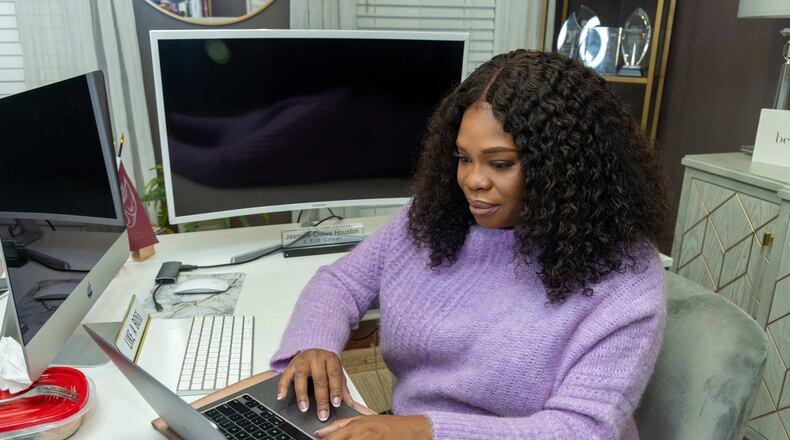Jasmine Crowe-Houston is out to show Atlanta and the world what can be achieved when altruism meets innovation.
Since 2017, Crowe-Houston has parlayed her passion for eradicating world hunger into a multi-million-dollar technology-driven corporation that’s helping to reshape the narrative on food waste and food insecurity in Atlanta and the nation.
In 2023, her for-profit company, Goodr, worked with its corporate partners, including Hartsfield International Airport, to divert from landfills 28.3 pounds of good food and give it to nonprofits to turn into meals for seniors, school children, and homeless individuals. A year earlier, Fortune listed Goodr, as one of the companies around the globe mobilizing the creative tools of capitalism to help solve the world’s social problems, including hunger.
“Jasmine Crowe-Houston exemplifies true servant leadership, driven by a mission to eradicate food waste for the greater good and put an end to global hunger,” said Andre Greenwood, interim CEO of Aetna Better Health Georgia, one of her company’s newest corporate partners. “At the heart of Jasmine’s success lies her unwavering compassion and commitment to leading and serving others.”
Credit: Phil Skinner
Credit: Phil Skinner
Crowe-Houston was focused on food hunger for several years before she launched Goodr in 2017.
When she moved to Atlanta about 11 years ago, she said she was struck by the magnitude of the city’s homeless.
"Seeing that many people experiencing homelessness just pulled on my heartstrings," Crowe-Houston said.
Not one to sit on the sidelines, she started whipping up 300 to 500 meals in her home kitchen twice a month and establishing "a pop-up restaurant” in a park or parking lot adjacent to an emergency shelter for the homeless.
She rounded up the food to feed the large crowds by coupon-clipping, bargain shopping, digging into her purse and accepting small donations of food and money. Hoping to ensure that the people she was feeding felt a sense of dignity, she brought in chairs, tables, linens and music at an event she called “Sunday Soul.” A Trader Joe’s in Midtown even donated flowers to enhance the ambiance, she said.
Crowe-Houston continued Soul Sundays for a couple of years after starting Goodr and stopped the mass feedings when the pandemic hit.
She knew the success of her company would hinge on data and analytics. Since that wasn’t her expertise, Crowe-Houston spent most of 2016 seeking help from tech experts. What emerged was an app that allows the company to constantly track the items its customers are wasting. That data is put into a report that shows how much of the food is being donated, recycled, or put in a landfill. The report also lets the company know the amount of tax breaks the contribution will earn.
“It’s really the core of our technology because you can’t manage what you don’t measure," Crowe-Houston said.
By 2023, the company that started as her one-woman operation had grown to 50-plus employees and proved very lucrative.
Crowe-Houston said that participating corporate partners received tax breaks for 2023 of about $9.2 million on the 28.6 million pounds of food they salvaged. She said the tax breaks are typically four times more than their costs.
Greenwood said Aetna Better Health began partnering with Goodr last year in seven cities in Georgia, Virginia, Louisiana and Texas, with Pop-Up grocery markets in Atlanta, East Point and Macon.
The collaboration made a significant impact, providing support to more than 2,100 families,” he said. Greenwood said that the initiative distributed 70,000 meals and over 84,000 pounds of food to those in need.
"Disturbingly, 33.7% of individuals reported sometimes or often facing challenges with having enough to eat, while 47.6% found themselves in the difficult position of having to choose between buying food and meeting other essential needs," he said.
Crowe-Houston said there’s much more work to be done. “I’ve never felt like I can say we made it as long as there are still people who are hungry. Until that’s done, I don’t ever think I’ll say my work is done.”
She says it may be the next generation that accomplishes the mission these days.
About the Author
Keep Reading
The Latest
Featured



